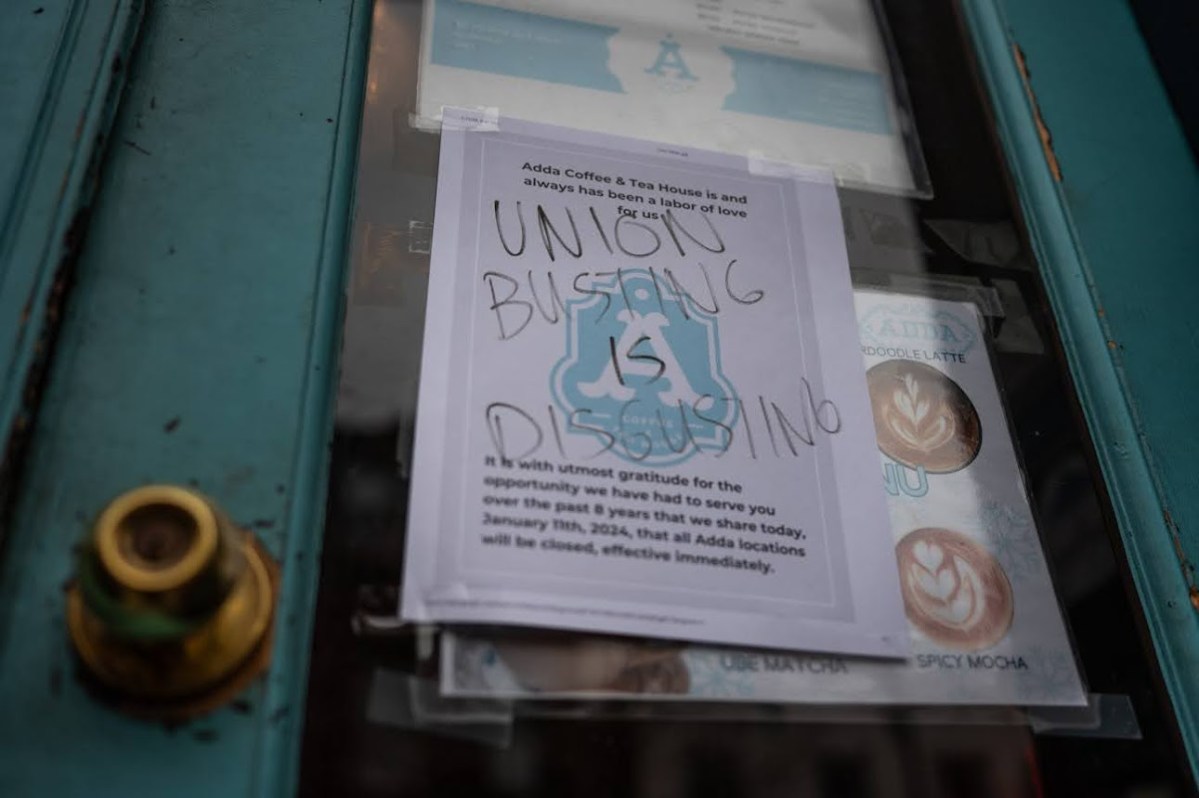More than two weeks after a local coffee shop chain shuttered its four locations throughout Pittsburgh, the laid-off staff are still making demands of their former boss in a dispute that raises thorny legal questions.
Earlier in the month, 25 workers at Adda Coffee & Tea House learned they would be out of work just hours after announcing plans to unionize to improve their job security.
Owner Sukanta Nag, of Fox Chapel, said in a statement the decision reflected long-accumulating losses. But the employees claim it was nothing more than illegal union busting. Legal experts say the unusual circumstances could raise important labor law questions amid a resurgence of union interest.
Union begins, company ends
On Jan. 11, employees of the local coffee chain announced plans to unionize, claiming inadequate compensation and unfair scheduling. Soon after, the company announced the immediate closures of all four locations — in Garfield, Shadyside, the North Side and the Cultural District.
Chris Gratsch, a former barista who helped lead the union effort, said there had been many conversations with management attempting to improve working conditions and wages, but management just kept asking for more time. The employees then made their grievances public through Instagram, writing “we love our jobs, and we deserve a say in how our store is run.”

A day prior, the United Food & Commercial Workers Local 1776 filed a petition with the National Labor Relations Board [NLRB] seeking union status for 25 Adda employees.
Adda announced on Instagram that it was closing “solely and entirely based on the financial viability of the business,” adding that it “is probably no surprise to some (or most) of you.”
Gratsch disagrees. “It’s inconceivable to think it’s anything but union busting,” he said, adding that the other employees also did not see this coming.
Nag did not respond to requests for comment.
“We’re devastated,” Gratsch said, adding that “at the end of the day we really did love our jobs.” He said he is grateful for the community support the union has received, calling it “overwhelming in the best way.”
The former Adda employees held a press conference in Sharpsburg on Jan. 17, in front of Atithi Studios, one of Nag’s properties. Elected officials were in attendance including Lt. Gov. Austin Davis, who said he’s “going to continue to stand with the workers” until Adda provides former employees with proper severance.
Gainey, Innamorato back Chatham faculty union push at East End card-signing
What happens next?
Legal experts say any appeal process will hinge on whether Adda’s closure can be shown to be linked to the union effort.
“If you can prove that a business shut down in response to unionization, that is a violation of the law,” said John Stember, a Pittsburgh labor and employment attorney who typically represents workers.

Mike Healey, another Pittsburgh labor attorney, said that in his experience, a company response like this is “relatively rare” but not unheard of.
“The timing is awfully suspicious,” he added.
Next steps for the Adda workers aren’t entirely clear. Gratsch declined to share details while negotiations continue.
“We are at the bargaining table with Sukanta in regards to the demands we made at the press conference,” he said. Those demands included severance pay, compensation for unused paid time off and the opportunity to retrieve personal items from closed Adda stores, TribLive reported.
If they don’t get what they want, they could ask the NLRB to intervene on their behalf.
Small housing authority files far more evictions than larger Pittsburgh-area agencies
When any charges are brought to the NLRB, they will first be investigated to determine their validity. Where legitimate grievances are found, the board will attempt to broker a settlement, and 90% of cases end in an agreement. But if that falters, the NLRB can issue a complaint that triggers a hearing with an NLRB administrative law judge who ultimately decides the outcome of the case – a process that could drag on for months or years.
If the Adda case reaches the NLRB, Healey said the critical questions will be: “What are the company’s plans? What are their intentions? What are their finances?” Timing, money and the nature of the closure will be important as the case moves forward, he added.
Public records suggest one recent financial hiccup. In December, the state Department of Labor & Industry filed a lien against Adda, alleging that the company owed $1,956 in unemployment compensation fund contributions, plus interest. Court records show the company then promptly paid.

If the company is still operating in some capacity or is trying to pivot their business, that could be problematic in the eyes of the law, Healey said. The decision will largely depend on Adda’s financial records and if there is substantial proof that there had been plans or indications that they would have to shut down prior to the employees’ decision to unionize, he added.
The NLRB’s powers include investigating alleged labor law violations, negotiating settlements of disputes, holding hearings before administrative law judges and seeking court orders against violators.
Gratsch hopes that people will not see this story as a cautionary tale for unionization.
“Organize your workplace, this should be a shining example of why you need it,” he said.
Delaney Rauscher Adams is an editorial intern at PublicSource and can be reached at delaney@publicsource.org.
This story was fact-checked by Rich Lord.









